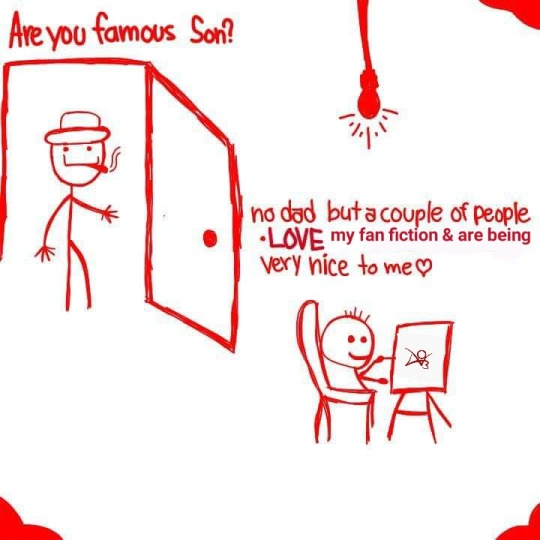Video
this is like just a fourth of a whole musical medley addressing that you can’t live like the simpsons anymore. harsh :(
87K notes
·
View notes
Text
love characters who are like "this is how the world works. this is how it has to be (because if i'm wrong i have to face what i've done // if i'm wrong i have to face whats been done to me) "
85K notes
·
View notes
Text
Currently amused by the idea that Aang is a delinquent. Forget punk or prep, he has tattoos, he's constantly destroying public property, he's encouraging kids to run away from home, he's homeless, he has no qualms about lying or stealing, has gotten into street fights, skips school, acts out in class, and he has canonically gone to jail and made friends with the criminals there.
Short of drug use, he is the textbox definition of a delinquent, he just hides it with how fucking cute he is.
460 notes
·
View notes
Text
Sokka's sexism
Sokka’s sexism from the earliest episodes is an interesting case, because the Southern Water Tribe, at least from what was presented to us on screen, doesn’t seem to operate that much on gender roles? Especially when compared to the Northern Water Tribe?
I mean, yeah, warriors (men) went to war, while women, children and the elders stayed at home. But as Hama’s story shows, when Fire Nation attacked Southern Water Tribe, both female and male benders were fighting against invaders arm to arm and it seems like they were the actual first line of defense there, not the non-bender warriors.
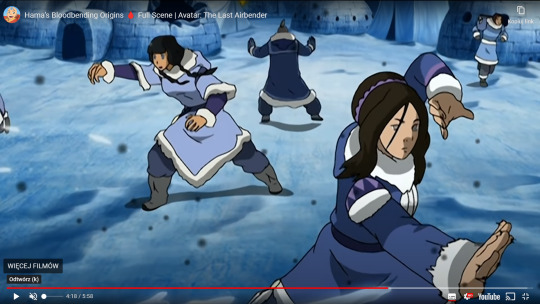
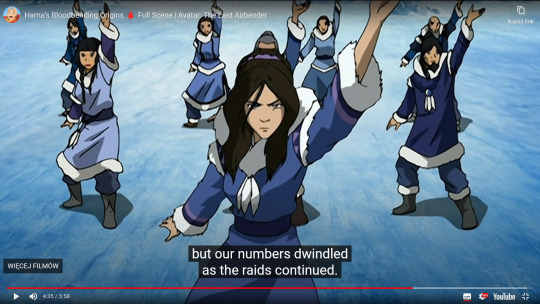
In contrast, during siege of North Pole, in the final of Book 1: Water, we don’t see any female bender helping defend their home except Katara, who was involved in protecting Aang when he was in Spirit World.
Since all the waterbenders were captured from the Southern Tribe, it makes sense that non-bender warriors stepped in and got involved with war, while the kids and elders were left under women’s care.
Another example comes from “a ceremonial test of wisdom, bravery and trust”, known as ice dodging. As Bato explained, it is a rite of passage for young Water Tribe members and in their village “done by weaving a boat through a field of icebergs.” When a child turns 14, their father was supposed to take them to ice dodging, so they could earn their mark. Though the episode itself was focused on Sokka’s ceremony, Bato never specified it as something that boys alone should do and not only Katara (girl) but also Aang (outsider) is allowed to take part in the ritual. Once Sokka proved himself, everyone of their group got a mark, as a sign they passed the test. Interesting thing to note, since Bato did not specify it is a rite of passage for boys alone, it suggests girls were expected to know how to sail in boats of the Southern Water Tribe. Of course, again, war didn’t allow to continue this tradition as men (Hakoda, in case of Sokka & Katara) left to fight against Fire Nation.
Later, when Sokka and Katara reunited with their father, Hakoda did not try to send away Katara nor relegate her to just a medic job during the invasion. In Northern Water Tribe episodes, we learned that teaching for waterbenders there was defined by gender - women were allowed to learn only how to heal, while men how to use their bending in fight. Hakoda, nor Bato nor other of their warriors even for a moment questioned Katara’s presence on the battlefield nor the presence of women in the ranks of their allies like a blind, 12 years old Toph or the female water benders from Swamps or female(?) soldier from Earth Kingdom
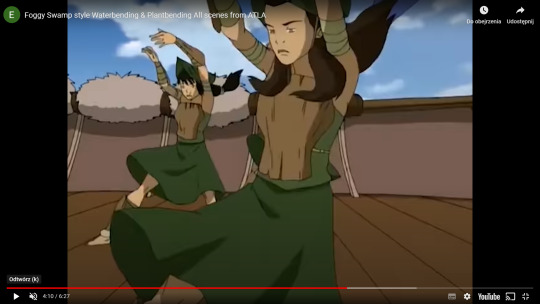
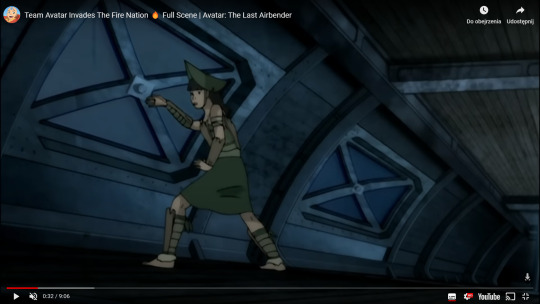
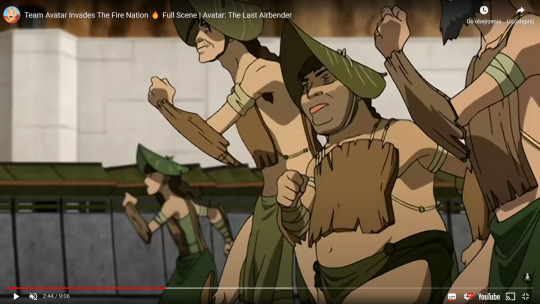

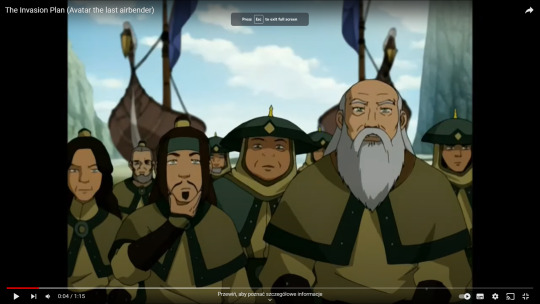
And during battle, Katara did not fight in rank with other soldiers, she first alone secured Appa during submarine attack, then alongside her brother and father took down guardhouses - Hakoda himself told her and Sokka to attack one when he took down the other one
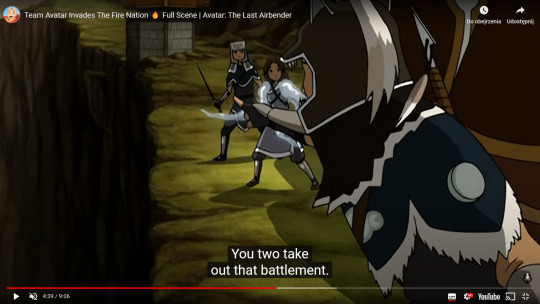
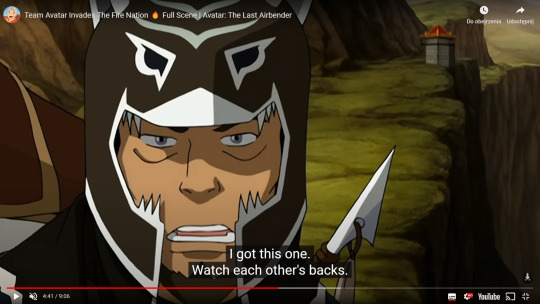
showing how much he trusted his 15 years old son and 14 years old daughter while ordering them attack on Fire Nation adult soldiers hidden in well guarder place.
Later, when Hakoda got seriously injured and Sokka temporary took the command of their forces, we could see that Hakoda relied on Katara to follow his troops and not ever once tried to send her back “to safety” or argued she should leave him behind, as often it happens with heroic (male) figures. Quite the opposite. When Katara offered him to “wait here if you want”, Hakoda firmly said “I want to press forward with the others”, which meant his daughter needed to come with him directly into an already ongoing fight (even if they stayed more at the rear of their army, they were still on battlefield).
She and her brother, alongside with the youngest members of Invasion, were forced to flee on Appa once the battle was lost, but no other adult woman was included. During Zuko’s coronation, when all war prisoners were released, in the background we could again see the female character(s) from Swamps.

And let's not forget how impressive Hakoda was by Suki when she single-handedly captured the warden at Boiling Rock prison and did not try to stop her from fighting against Ty Lee alongside Zuko and Sokka against Azula.
Understandably, we have no idea how the Southern Water Tribe and its culture looked like before the war, even arguably, the characters themselves may not have a clear idea due to growing up in dire times. But my point is, Hakoda and Bato, the two main adult Southern Water Tribe’s warriors that Avatar: The Last Airbender allowed us to know more about, have never shown any direct sexism toward Katara or other female characters. And though Sokka was the oldest boy at their village, there is no reason to think women did not hunt in absence of men, because one person would not be able to provide for a whole community 24/7. Also, as Hama proved, the Southern Water Tribe’s waterbenders were capable of fighting and their gender did not play any vital role the way it happened in their sister tribe at North Pole.
Of course, Fire Nation’s repeated attacks affected residents of South Pole and their living conditions but from the little bits the show gave us, I think it is correct to assume if Sokka grew up with Hakoda around to guide him as he should, his behavior would be different from the sexism and dismissive attitude toward Katara or Kyoshi Warriors. For one, logically thinking Southern Water Tribe’s warriors need to do all the cooking, sewing and keeping their camp clean all on their own during war so it is not a “girly job” but a vital part of a warriors skills to survive and ensure their equipment is in the best condition. But Sokka doesn’t know it, because there is no one to teach him the importance of those skills. All Sokka had was father’s farewell words to cling to - and I’m not sure if Hakoda truly expected his son to be able to protect Katara and the village in his absence, or he just tried to make Sokka feel a bit less depressed about being left behind. You know, by giving him purpose and a Big Important Job to focus on and to feel needed and trusted.
Which leads me to think that Sokka’s sexism is not rooted in Southern Water Tribe’s culture itself, but in his own insecurity and pressure of being the oldest boy in the village. If girls could be warriors - and be better than him - it would put into question all his self-worth, purpose and the trust given by father. Once Sokka met Kyoshi Warriors and later all the skilled girls, it challenged him on a very personal level, but he accepted the truth and moved on and alongside, finally became a true warrior and a man.
And I find it indeed an interesting case, as Sokka’s sexism and dismissal of girls is not necessarily stemming from the culture he is part of, but rather is the effect of not knowing said culture & pre-war history of his Tribe. And of course, from his own insecurity.
59 notes
·
View notes
Text
"I can fix him" not in a "I can make him into a better person" way but in a "if he was my character I would've handled his story better" way
73K notes
·
View notes
Text
truly what is r the main differences like ACTUAL differences not things in common with adhd and autism
3K notes
·
View notes
Text
See here’s the thing. It’s not that Secret of NIMH is a bad movie. It’s not that themes about believing in yourself, or about The Power Of A Mother’s Love, are necessarily bad.
It’s that–
It’s that the book is so much bigger and so much smaller. So much more.
It’s that We All Help One Another Against The Cat. And that saves an entire civilization, in the end. And it saves the life of a single little boy. And those things are equally important in the end.
In Mrs Frisby And The Rats Of NIMH, everything, the whole world, comes down to this in the end: No act of kindness, no matter how small, is ever wasted.
An elderly mouse sets up shop as a healer, charging nothing, asking nothing in return. The frightened single mother gets free medicine from him. Because she has a doctor to go to, she’s in the right place at the right time to see a very young crow tangled in string, and stops despite the danger to free him. Moved by her patience and courage, Jeremy refuses to abandon her and risk her being killed by the cat whose attention his struggle has caught. He is gracious and polite and humble as he flies her to her home, so she swallows her irritation at his youthful foolishness and speaks to him respectfully, so a friendship is forged between them that lasts longer than a single mutual rescue, so she tells him about the danger her son is in, so he vouches for her to an owl. The owl is interested enough by her nerve and the unlikely bond of friendship between them that he gives her his genuine time and attention and speaks to her for long enough that Jeremy calls out to her by name to see if she’s safe, which means the owl recognizes the name, which means he can send her to the rats–
Simple, understated, mundane, none of them coincidences. All of them a choice. To do what’s right and not what’s safest. To do the hard thing and not the comfortable one. To act with compassion even when you’re annoyed at the deviation from your plans.
Justin opens a cage door for eight little mice who mean nothing to him, who he’s never met before. Nicodemus sees the smaller, lighter mice in mortal peril and reaches out instinctively to grab one, two, and the rest are gone before anyone even has time to react. The entirety of A Group having seen what comes of carelessness grimly throws themselves into keeping these two vulnerable mice alive, bracing them with their bodies, holding them close, anchoring them to safe points. Mr. Ages, not Nicodemus, proposes using a screwdriver as a pry-bar. Jonathan crawls through a hole too small for rats and frees them all. Justin burns hours they cannot spare to venture back into the tunnels–
(Having escaped, having reached freedom and safety against all odds but knowing others were left behind, he turns back–)
–Calling, hoping, and they find no one and it was still worth the risk, even if no one was saved, because they might have been. The care he shows for the mice means Jonathan and Mr Ages stay with them past the escape, form a friendship that lasts years. That gives his name such respect among them that when they hear it, they drop everything to care for his wife and son.
Dragon cannot be drugged because they have no mice to run the risk anymore. The rats decide there’s nothing for it–they will work in the open. Risk not only their lives but the discovery of their entire civilization if caught, in order to move a cinder block eight inches to the right, to save the life of a single tiny child, their dead friend’s son. The child’s mother volunteers to run the risk for them. A human boy says wait, don’t let the cat in yet, I’ve caught a mouse because human boys are loud and big and clumsy and it’s traumatizing and she’s hurt but Billy Fitzgibbon saw a tiny vulnerable thing and wanted to keep it safe. And so she remains in the kitchen, and hears about the death of Jenner’s team, and is able to warn the rats just barely, barely in time.
Because Jenner was not a villain, because he was never cruel. Because he disagreed with his oldest friend but Jenner and Nicodemus never hated one another, so they never wanted anything but the best for each other. So Jenner and his supporters defected peacefully. So their terrible, fatal mistake happened in the public eye, not too far away, because there was no hostility between them. Because they only ever wanted one another to be safe and happy, in the end.
And the surviving rats escape, save for one who stumbled and fell as he ran from the gas, and one unnamed who might have been Justin, who might not, and does it matter whether it was someone we knew, does it matter, should we mourn him less if he wasn’t, does his name matter more than that he was kind and brave and died for it? That after being kinder and braver than anyone had any right to ask, he dragged one last brother out of a cloud of cyanide and then went back?
They escape, they survive, just as surely as Timothy will grow up strong and healthy and the Frisbys can now return every year to a safe, warm home and never have to leave it. A civilization deep in the forest, safe and secure and entirely their own, because Mrs. Jonathan Frisby was in the right place at the right time to tell them to hide their machines and run–
Because she was kind to a crow.
Because she had a neighbor who dedicated his life to helping others.
Because her husband died helping the rats build a home that was their own, that he would never share in.
Because they were his friends, because he opened a grate for them once, because they held him close and shielded him with their bodies when he was too small.
Because a rat named Justin opened a door.
Because kindness is hard and scary and hurts sometimes, but it’s always worth it, it’s never wasted, compassion finds its way back to you in the most unlikely ways and even when it doesn’t, when you get nothing in return, it was still worth it to try.
Because we all help one another against the cat.
And how dare Don Bluth look me in the eye and try to say that isn’t good enough.
How dare you try to tell me that isn’t magic.
5K notes
·
View notes
Text
There’s that post that’s like ‘everyone should get into a tiny niche fandom at least once’ fully agree, that was really fun -- but I would like to add that everyone should get into a fandom where their opinions run counter to major fanon because it really teaches you about sticking to your guns and trusting your interpretation of the text without having to rely on peer validation
because WHAT are people talking about sometimes
10K notes
·
View notes
Text
I am aware I have died on this hill before but people who really strenuously argue that fanfic isn't "real writing" drive me insane. what do you meeeaaaaannn. besides the fact that any attempt to define "real art" vs "fake art" is inherently reactionary, it just doesn't make any sense. it's Writing. people Write it. what the fuck are you talking about.
7K notes
·
View notes
Text
We should just flat-out tell kids as soon as they are old enough to understand it, "Some rules are made to prescribe ideal behavior in individual people, some rules are made to modify real behavior in the average person, and most rules exist to make things simpler and easier for the person that makes the rules."
or, a simpler way of putting it, "Sometimes rules are saying exactly what a person should be doing and you won't be safe/won't be successful without following the rule. These rules can only be broken in extreme circumstances OR if you understand what will happen, WHY that will happen, and are ready to deal with the consequences.
"Other rules are meant to change the amount of people doing something, or change the kind of person that is doing something. It's not actually expected that everyone follows the rule, only that people will break the rule in smaller numbers or only if they have a "good reason" for it. Some rules like this have no consequences, they are just describing what someone would really like you to do, even if that person has no power to make you do it or cause consequences if you don't. Some rules like this are a kind of secret handshake where you are supposed to be able to figure out that you're supposed to break the rule if you're the right kind of person. Some rules will only have consequences if you get caught, and sometimes it's so easy to not get caught that no one faces consequences unless someone is specifically trying to catch the person breaking a rule.
"Everyone will tell you that all rules are the first type of rule. They are lying, and it's very important you know that they're lying, because you will need to break rules and you will need to be safe while doing it."
3K notes
·
View notes
Text
When kids (AKA anyone younger than a millenial) today try to picture life before ubiquitous internet they always freak out about not having a maps app to get to places, or social networks, etc. But there’s something you can’t comprehend and that everyone who was a teenager or older before the late 00s have imprinted in our DNA: The boredom.
Nowadays, you can’t even start imagining how deep boredom can be. You can’t understand that infinite dread you feel when you lose your bus home and the next one don’t arrive until an hour later, so you know you are going to be waiting at the bus stop for an hour without absolutely nothing to do but looking at cars passing by.
568 notes
·
View notes
Text
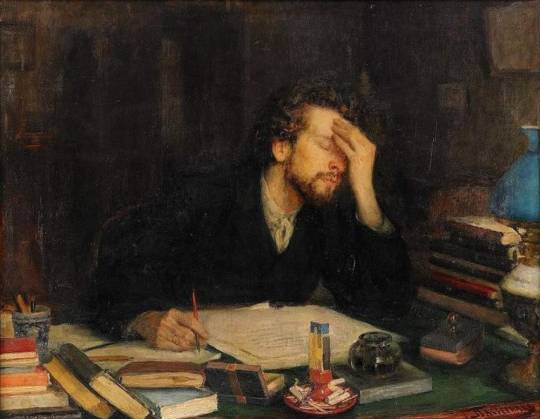
Leonid Pasternak (Ukrainian, 1862–1945) - The Torments of Creative Work
44K notes
·
View notes
Text
Seeing a post that you know a mutual will like and reblogging it to add enrichment to their dash like giving a tiger in a zoo a cardboard box
67K notes
·
View notes
Text
youtube
Till tender is far too fierce for us, winter is almost here for us.
Or: two boys from Brooklyn and how they gave up their personhood. But before they were tools belonging to sprawling superpowers, they belonged to eachother.
Happy 10 years to CA:TWS
ao3 (includes vidding notes) | youtube |
song by astronautalis and p.o.s.
123 notes
·
View notes
Text
write weird shit. Write indulgent au fanfiction and self insert fics. Write creepy horror scenes and random character crossover dialogue. Write in a different genre. Write that sex scene that you know won’t make the cut. Write about sentient furniture turning into werewolves that try to date your MC. Write whump or hero/villain fic. Write your kink. Write your worst nightmare. Write your delusions of power and fantasies of control. Write whatever the fuck you feel like. Write whatever comes to mind. You don’t have to share it with anyone (but you can). Your writing impulses don’t define your morality anymore than your reading preferences, and actually going outside your comfort zone will improve your writing skills (making a horrifying villain sympathetic requires good characterization). Even if it doesn’t improve your skills, that’s still something you created out of nothing. It’s still valuable. Don’t let purity culture kill your creativity. That’s how culture stagnates. That’s how writing stops being fun.
4K notes
·
View notes
